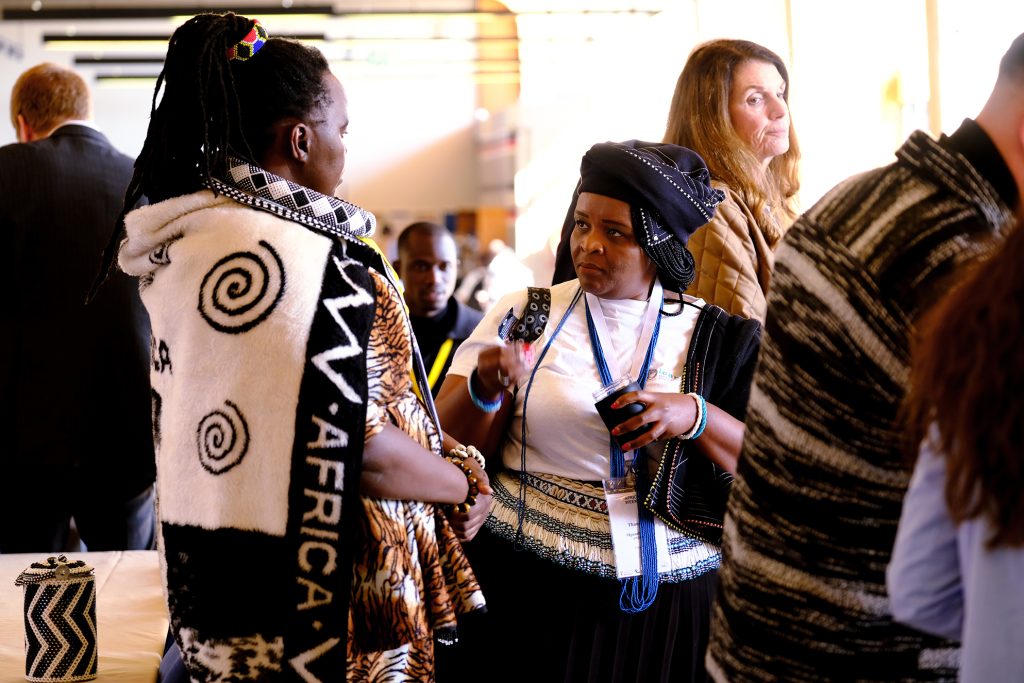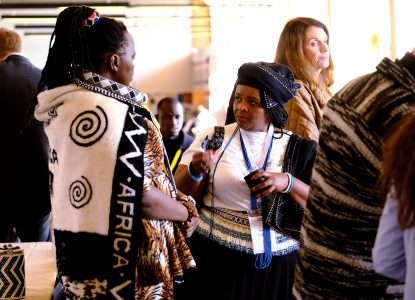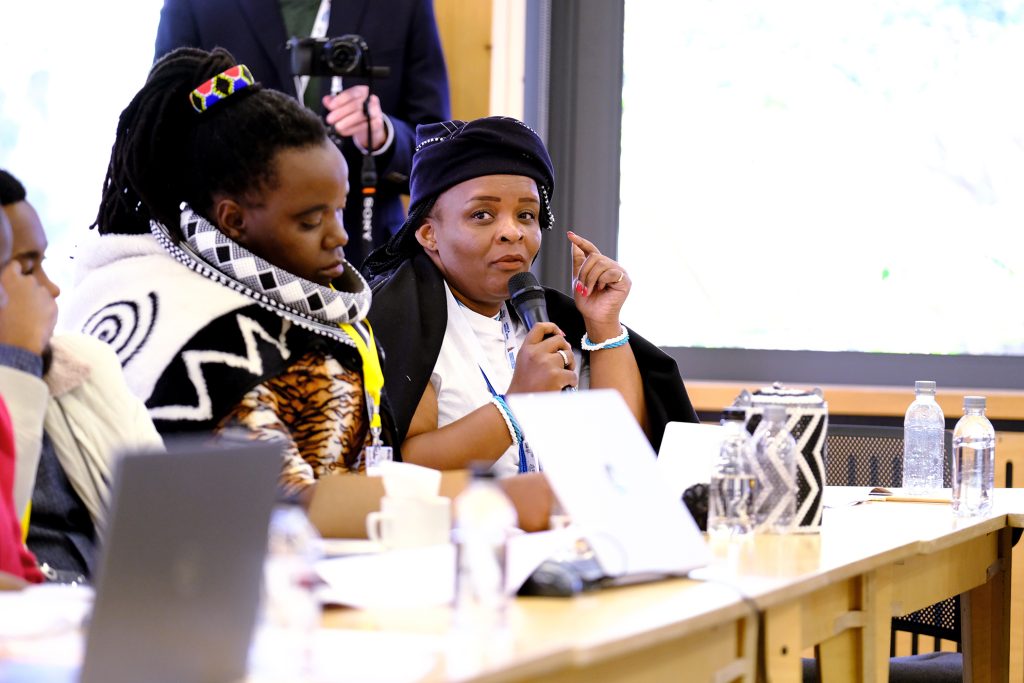By JoAnne Wadsworth, Communications Consultant, G20 Interfaith Forum.
– – –
On May 28-29, 2025, the G20 Interfaith Forum Association hosted Africa Week at Future Africa, University of Pretoria, bringing together global experts to examine complex intersections between traditional belief systems, indigenous rights, and international policy frameworks. The session on “African Traditional Religious Belief Systems and Spirituality” featured distinguished speakers including Dr. Katherine Marshall, Vice President and Chair of the Policy and Networking Committee for IF20; Dr. Nicholas Miller and Professor Pieter Francois, both Subcommittee Co-Chairs of IF20 for Freedom of Religion or Belief; and Sogol Jafarzadeh from the United Nations University Institute for Water, Environment, and Health. Together, they led participants through a collaborative review of draft international guidelines aimed at bridging individual religious freedom rights with collective rights of indigenous and traditional communities. This represents the third of four blog posts capturing key insights from this landmark gathering.
Framing the Global Challenge
Dr. Katherine Marshall opened the session by welcoming attendees and highlighting the G20 Interfaith Forum’s mission to unite religiously linked organizations in addressing global challenges. Since its founding during the 2014 Australian G20 Presidency, the IF20 has convened annually to align faith-based perspectives with the G20 agenda.
For 2025, under South Africa’s presidency, Dr. Marshall explained that the forum is focusing on five key priorities: ending hunger and poverty, addressing unsustainable debt, enhancing disaster preparedness in the face of climate change, protecting vulnerable populations such as children and victims of trafficking, and promoting social cohesion through education and healthcare. She emphasized how these priorities align with the G20 themes of solidarity, equality, and sustainability, underscoring the unique moral and practical contributions of religious communities to global governance.
Three Approaches to Faith-Based Policy Engagement
Dr. Nicholas Miller outlined the vital contributions religious communities make to global public policy, particularly in an increasingly secular world. He identified three key ways faith groups can engage with policy processes:
- First, by ensuring policies respect religious freedom—what he characterized as “Don’t tread on me”—protecting the space for religious communities to practice their beliefs without government interference.
- Second, by partnering with governments to communicate shared values, especially in areas like public health where religious and secular authorities often have common ground.
- Third, by contributing unique moral insights—such as stewardship principles in environmental policy—that can enrich secular policy discussions with perspectives that might otherwise be overlooked.
The Complexity of Indigenous and Traditional Rights
Miller also addressed the distinct challenges faced by indigenous and traditional peoples in the context of religious freedom.
“Unlike voluntary religious associations, these communities often have deep, inseparable ties to land, culture, and civil structures, making religious identity more complex and intertwined with communal life.”
This complexity, he emphasized, requires special consideration in policy-making, recognizing that religious freedom in such contexts involves both individual and collective rights. His remarks underscored the importance of inclusive, respectful engagement with diverse religious and cultural traditions in shaping equitable and effective global governance.
Collaborative Guidelines Development
Professor Pieter Francois introduced the session’s collaborative component: a detailed review of draft international guidelines designed to bridge individual Freedom of Religion or Belief (FoRB) rights with the collective rights of indigenous and traditional communities. He outlined the session’s structure with an initial discussion followed by a detailed, line-by-line review of the draft document titled “Guidelines for Assessing the Intersection of the Rights of Indigenous and Traditional Peoples, Group Rights, and Freedom of Religion or Belief.”
Francois emphasized the complexity of balancing universal human rights with culturally specific realities, noting that FoRB, while long established in international law, remains one of the more contested and misunderstood rights. Drawing from experiences in Brazil, he illustrated how definitions of ‘indigenous’ and ‘traditional’ peoples vary significantly by region, complicating efforts to create inclusive, actionable guidelines.
Indigenous Peoples as Environmental Partners
Sogol Jafarzadeh brought a crucial environmental perspective to the discussion, highlighting the critical role of indigenous peoples in environmental policies. She presented striking statistics:
“Indigenous communities manage 25% of the world’s land surface, 37% of protected areas, and 36% of intact forest lands.”
Jafarzadeh emphasized how the UN has increasingly recognized indigenous peoples’ contributions to climate action, particularly through platforms like the Conference of the Parties (COP) in Colombia, Bucharest, and Riyadh. Her key message was clear:
“Indigenous communities are essential partners in addressing global challenges like climate change, food security, and environmental conservation, bringing unique traditional knowledge and a close connection to natural resources that can inform more effective global strategies.”
Integrating Ubuntu and Cultural Preservation
The group discussion that followed revealed complex perspectives on defining indigenous and traditional peoples, particularly in the African context. Participants challenged the terminology itself, with some arguing that in Africa, most groups could be considered indigenous, making the distinction problematic.
The conversation revealed preferences for alternative approaches. Rather than using terms like “indigenous,” “traditional,” or even “group rights,” participants suggested “community rights” as better reflecting the Ubuntu philosophy of collective identity. This shift in language aimed to avoid colonial-era categorizations while recognizing the economic marginalization that affects many communities across Africa.
Participants emphasized the importance of integrating Ubuntu principles into education and stressed the need for knowledge sharing and language preservation among African communities. The discussion highlighted concerns about the marginalization of traditional communities despite their numerical majority in many African contexts, and the need for state investment in their development.
Key concerns included avoiding colonial-era categorizations, recognizing the economic marginalization of majority populations, and creating frameworks that respect cultural practices while promoting unity. The group emphasized the need for a nuanced approach that goes beyond labels, focusing instead on preserving cultural heritage, language, and spiritual practices across different African communities.

Balancing Individual and Collective Rights
The conversation also revealed the ongoing challenge of balancing group rights with individual rights within traditional communities. Participants acknowledged the importance of addressing economic and social inequalities to ensure the full realization of religious freedom and other fundamental freedoms.
The discussion revealed that effective policy frameworks must account for the reality that religious, cultural, and economic rights are often inseparable in traditional African contexts. This interconnectedness requires policy approaches that can protect individual conscience while respecting collective cultural practices and community decision-making structures.
Moving Forward with Inclusive Frameworks
Miller and Francois concluded by inviting participants to offer critical feedback on the document’s scope, clarity, and applicability to South Africa’s diverse contexts. They stressed the importance of surfacing a wide range of perspectives to inform a nuanced and representative final product.
The insights from the day’s discussions, they explained, would be taken back to the document drafting committee, where they would be considered to help shape a more inclusive and effective proposal for the G20. This collaborative approach exemplified how global policy development can benefit from genuine consultation with affected communities and regional experts.
Implications for Global Governance
This session demonstrated the complexity of creating international frameworks that respect both universal human rights principles and the diverse ways different communities understand and practice those rights. The discussion revealed that effective global governance requires moving beyond one-size-fits-all approaches to develop nuanced policies that can accommodate cultural diversity while protecting fundamental freedoms.
For the G20 and other international bodies, the session highlighted the importance of including traditional and indigenous voices not just as subjects of policy, but as partners in policy development. The Ubuntu-centered approach emerging from the African participants suggests that collective identity and community rights can coexist with individual freedoms when policy frameworks are designed with sufficient cultural sensitivity and flexibility.
– – –
JoAnne Wadsworth is a Communications Consultant for the G20 Interfaith Forum Association and Editor of the Viewpoints Blog.



